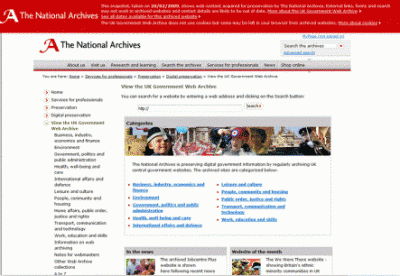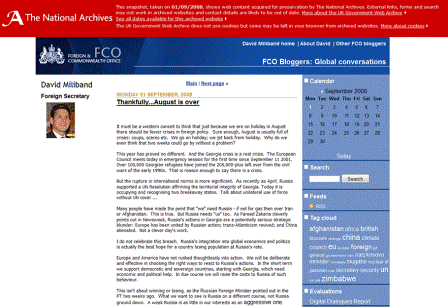In the next couple of posts I will try to set out what the development of the UK Government Web Archive means for students of contemporary history and how it is a valuable resource for those studying official records. I recently discussed some of these ideas at the Archives and Society seminar when presenting alongside colleagues from our Web Continuity department.[ref]1. Tom Storrar spoke about technical elements of the UK Government Web Archive, and Suzy Espley talked about some of the legislation behind it. [/ref] In this post I will show how developments in the web – and government adaption of new practices, such as blogging and social media – are reflected in content captured into the UK Government Web Archive and what that says about relationships between the public and the state.
Defining the ‘contemporary’ element of the study of contemporary history can be a difficult exercise. As with other temporal definitions, boundaries and parameters are fluid and ultimately somewhat arbitrary. For example, when I started in my role about two years ago we saw contemporary history as a post-1945 study (a definition borrowed from, amongst others, the Institute of Contemporary British History) but to ensure that First World War commemoration is appropriately covered we now cover the post-1900 period. Brian Brivati in The Contemporary History Handbook (one of the thickest handbooks I’ve seen) moved the starting point the other way and thought that contemporary history could be defined as starting after the Suez Crisis, and therefore a post-1956 study.[ref]2. Brivati, Brian, The Contemporary History Handbook, (Manchester, 1996), p.xvi. [/ref]
Of course, it would not be possible to study contemporary history without knowledge of preceding periods as events, ideologies and personalities do not neatly package up into time-bound periods. One thing rarely discussed, though, is the end point of contemporary history, or the point when written sources are less readily available, a point particularly pertinent when it comes to official government records.
Files are subject to thirty year closure (although we are moving to a 20 year rule) which means there is a lag where the official record is not accessible. This restricts researchers to speeches, press releases, and newspaper articles, but for access to the thoughts of ministers, for example, they are restricted to witness seminars and oral testimony – or unchallenged opinions in autobiographies. If students do not have access to key parties in certain episodes or institutions then there is a danger that contemporary history could be the preserve of those with access to influential institutions.
This brings us to the UK Government Web Archive, which collects and preserves the online official government record and makes it freely available to researchers online. Over the last ten years The National Archives has worked on improving the resource, and ensuring that the websites of central departments, agencies, non-departmental public bodies, and NHS sites with a national interest are captured and presented to the public.
This provides the contemporary historian with another resource to access the official record. Evidently, the content in the UK Government Web Archive will remain different to the secret files released under the 20 year rule, but once they are opened researchers have an opportunity to compare public utterances made at the time with the secret discussions going on behind the scenes.
My colleague Linda Stewart wrote a while ago about David Miliband’s blogging activities, maintained when he was a minister at the Office of the Deputy Prime Minister and Defra,[ref]3. The Department for Environment, Food and Rural Affairs, established in 2001. [/ref] and continued when he became Foreign Secretary. These posts were captured into the UK Government Web Archive and show a minister communicating directly with members of the public, civil servants, and other governments. On 1 September 2008 he wrote about the Russian incursion into Georgia, rebuking the Kremlin and placing the story within the context of the media’s August silly season.
At the moment we can only understand what the Cabinet would have been considering at this time from public speeches and perhaps some passing references in autobiographies. The UK Government Web Archive provides some official context, through the direct ministerial communication as demonstrated by Miliband’s blog. There is a possibility that there was some special advisor involvement in this, but one could see the blog as a form of communication with the public lacking the usual filter of press release and newspaper article. Furthermore, there will be a point when researchers can compare files from the Prime Minister’s Office, Cabinet, and the Foreign and Commonwealth Office, alongside other – perhaps more prosaic – information in the UK Government Web Archive, such as FCO advice to British nationals. This will give the contemporary historian of the future a more complete documentary picture.
As for the contemporary historian of the present, he or she is provided with the opportunity to view the development of government communication on the web, from early websites to blogs; and from democratic sites such as Your Freedom and the e-petitions site to the fully interactive GOV.uk. This, in itself is worth noting, not only as it exemplifies an attempt to demonstrate flexibility within government communications, but because it represents in quite vivid terms, through publicly published petitions direct to a department, what the public has come to expect from the state.


Whilst the web archiving is of some use it is of course limited and it is effectively the Government’s press releases and it should be viewed in that light. The date when Contemporary History starts is debatable as to whether 1945 or even 1956, the latter is of course linked to the disappearance of the idea that ‘Britain rules the waves’. I would argue that 1960 is also an alternative date.
One should remember that not all files will be released after 20 years and may be closed for up to 100 years or under security retentions. I note that you do not mention Treasury files, Treasury are one of the key central departments.